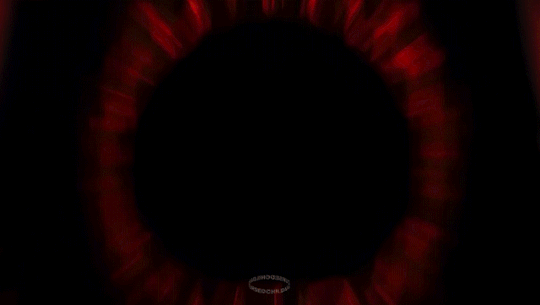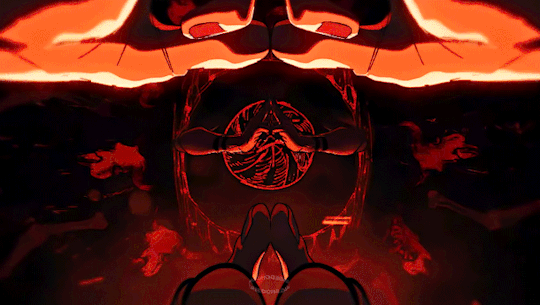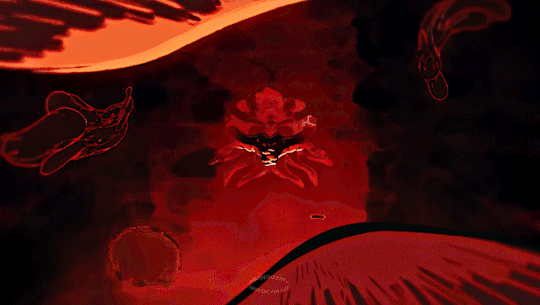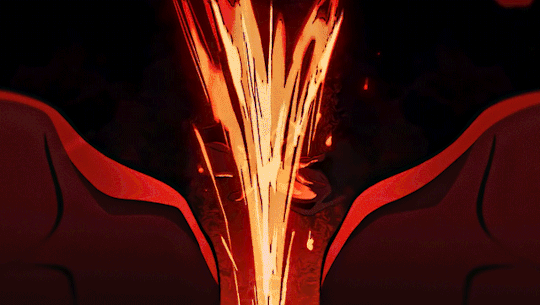Suicide dripping out of her veins grasping for breath.
Don't wanna be here? Send us removal request.
Text
How to Keep Yourself From Editing As You Write
Not to say there's anything wrong with editing as you write, but if you want to stop yourself and find you can't, here are some tips.
1. Write longhand or on a typewriter.
Not only is it more difficult to edit as you write, changing mediums can help you establish new habits.
2. Try one of the many writing apps that come with features that discourage editing.
Cold Turkey Writer won't let you close the window until you reach a certain number of words. The Most Dangerous Writing App will delete all your progress if you stop typing. And I know there are at least a few apps that disable the backspace key.
3. Set a timer and a word-count goal.
This relies a bit on willpower, but the timer really helps. I talk about the specific process I use in this post.
4. Take a break from reading writing advice.
While you can’t ever “un-know” what you’ve learned, it’s especially difficult if you’re constantly absorbing critical information while at the same time trying to be creative. Give your right brain some space. Go outside, read fiction, paint or draw. Get away from your Tumblr feed. Turn off the internet while you write.
5. Practice, and be patient.
You’ve developed a habit of editing-while-writing and it will take some time to reverse it. Give yourself short practice sessions of not editing: Try to write 50 words without editing. Do some timed freewriting. Think of it as a muscle that needs to be exercised to get stronger.
Hope this helps!
/ / / / /
@theliteraryarchitect is a writing advice blog run by me, Bucket Siler, a writer and developmental editor. For more writing help, download my Free Resource Library for Fiction Writers, join my email list, or check out my book The Complete Guide to Self-Editing for Fiction Writers.
316 notes
·
View notes
Text
suguru’s “are you the strongest because you’re gojo satoru or are you gojo satoru because you’re the strongest?” really hits you when you come to terms with the fact that satoru is nothing but a tool for jujutsu society — even in death. suguru will always be the only one who questioned it, who saw satoru as more than “the strongest sorcerer” because he was his best friend first and foremost :)
6K notes
·
View notes
Text
"Based on data gleaned from the nearly 10 million military dependents it insures, the U.S. Department of Defense has repeatedly called the evidence supporting ABA “weak,” noting there is no research to determine whether the small number of participants who show improvement — 15% — do so because of treatment or simply because a child has matured. After a year of the therapy, the department reported to Congress in 2019, 76% of 16,000 participating autistic children saw no change, and 9% worsened."
43K notes
·
View notes
Text
gojo was doomed from the moment geto left him. he was stuck in the past and he never tried to move on. he mourned his happy youth and suguru every single day, and his image of geto was never tainted by what happened to him. geto remained as his moral compass until the very end, and choosing to actually kill the higher ups was once again a decision that he took while thinking of geto and feeling the need to catch up to him. that’s not to say that he wasn’t loved by others, but it’s more about him closing himself off and never allowing himself to get over the past. hell, i don’t even think he wanted to move on.
he was absolutely devastated by geto leaving him behind, and then even more when he had to kill him and then even more when not disposing of his body (out of love) led to geto being used as a tool for evil purposes. so much that the first thing he did when he came out of the box was to find kenjaku and assert that he was going to give geto a proper burial.
but he was sooooo doomed. so doomed that even winning against sukuna wouldn’t have been enough for him. the only scenario in which he would have been satisfied with his accomplishments was one where geto was right beside him. he goes so far as to imagine his best friend patting his back among his students and the others. he was stuck in the past, geto was his first and last warm spring of youth, he brought him light and then took it away with him when he left.
448 notes
·
View notes
Text
"Gojo should've gotten to live as a person-" THAT’S THE POINT. That is the ENTIRE point of JJK. Every single character who died was someone who "should've gotten to" do a lot of things. Riko should've gotten to live for herself, Geto should've had the chance to be a teenage boy given support and safety, Junpei should've gotten to live without fear, Nobara should've had the chance to let people in without fear, Nanami, Yuki, Mai, Higurama, EVERYONE.
Here's the thing, Gojo is on this list. Gojo isn't the exception because JJK at its core is a story about how overarching systems destroy people; bullying, capitalism, sexism, etc. And this system does not need people to run it. Which is why killing Kenjaku didn't stop shit because yeah he started this mess but its grown beyond him. Fuck, it was there before him.
This is also why despite Sukuna & Uraume being the only ones who are actual threats, nothing is better. The cast got rid of the higher-ups, jujutsu tech as it is, is no more. The major families are dismantled. This should be a victory. This is what the Sashisu gen pointed out as the problem but things have never looked more bleak.
Why? Because the problem isn't Kenjaku, Sukuna, curses, sorcerers or curse users. It's the existence of Cursed Energy itself. This has been pointed out multiple times by Yuki. Its the system and Gojo has been complicit to the system for a long, long time. He's also it's victim. Gojo says he's the exception a lot, but as everyone has rightfully pointed out, he was nothing more than a weapon to jujutsu society.
JJK has followed a very clear pattern to every character right from Geto to Junpei to Riko; characters are representatives of systems of suppression, and they will not escape it. I can't recall a single character that's escaped unscathed, much less alive.
Is it disrespectful? Yes. Is it demeaning? YES. There has not been a single character death that's been dignified in JJK. It's all on a scale of bearable to absolutely horrifying. It is genuinely wild seeing people resort to threatening the author AGAIN. Calm the fuck down. You are entitled to feeling upset about how Gojo has been treated but Yuta stans are being calm despite Yuta arguably suffering the "he is a weapon" thing WORSE. It's still a fictional character and JJK's narratives never treated Gojo with any exceptions despite the character saying otherwise.
2K notes
·
View notes
Text
#truly a tragedy
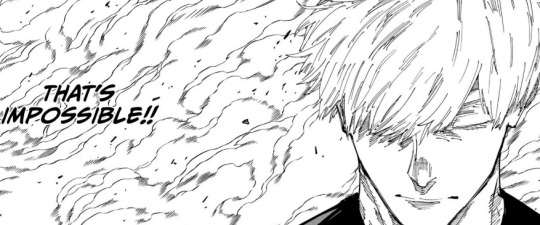
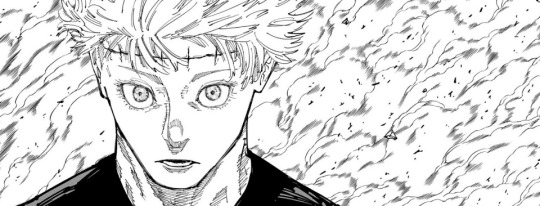
The Next Gojo Satoru
As you've probably guessed I have a lot to say about this chapter. However, right away I want to start out by pointing out once again that the fandom is taking a mostly gojo-centric view of this chapter. Which I understand it's Gojo's body that's being puppeteered around and dehumanized in the exact same way that Kenjaku one of the sickest and most inhuman characters used Geto's body.
However I think it shouldn't be understated how shocking it is to see Yuta betray all of his values like this. The most human character who represents love in the cast has given up on the cast and betrayed someone he loves. So let's talk about what this all means for Yuta under the cut.
GOJO GETS AN F IN TEACHING.
I understand why most of the focus is on Gojo, because yes Gojo's body is the one being violated here. He's not even allowed to rest in death after fighting on the front lines against Sukuna to the point where his brain was hemmoraging in the middle of battle and he was brutally cut in half.
Considering how much horror Gojo experienced when he saw Geto's body taken from him and made into Kenjaku's pupet. Cosidering the horrible pain that Nanako and Mimiko endured just seeing Geto's body still moving around denied a good death (Nanako and Mimiko were tellingly willing to let go and not try to take revenge against Gojo for killing Geto because of their friendship even though Geto was their whole world, but they'd never forgive Kenjaku for taking his body). Considering that Gojo even went out of his way to say he wanted to kill Kenjaku / Geto on Christmas Eve again in order to give him a proper burial it's understandable how horrifying this update is.
This is also a series where the two main antagonists are parasites who take the bodies, and steal away all bodily autonomy from characters like Yuji and Megumi and then force them to do horrible things they would never do and bear witness to it, such as the slaughter at Shibuya, or the murder of Tsumiki at Megkuna's hands.
It's understandable how people had such a visceral reaction to this chapter. However, I think the fandom has a tendency to paint Gojo like he's the central victim of all of Jujutsu Society when he's both victim and perpetrator.
Gojo is someone who has only been regarded as the strongest his entire life, and been used as a tool to keep Jujutsu Society stable his entire life. Gojo is also someone who never tried to be anything other than the strongest, never tried to empathize with anyone other than those who were just as strong as he is, and who raised all of his students to be tools too.
To illustrate my point here's an incredibly similiar character from Tokyo Ghoul: Arima Kishou. They are so similiar that they're both white haired mentor characters to the protagonist, they're both the strogest in their respective worlds, and Gege straight up copied this section of panels from the Tokyo Ghoul Manga.
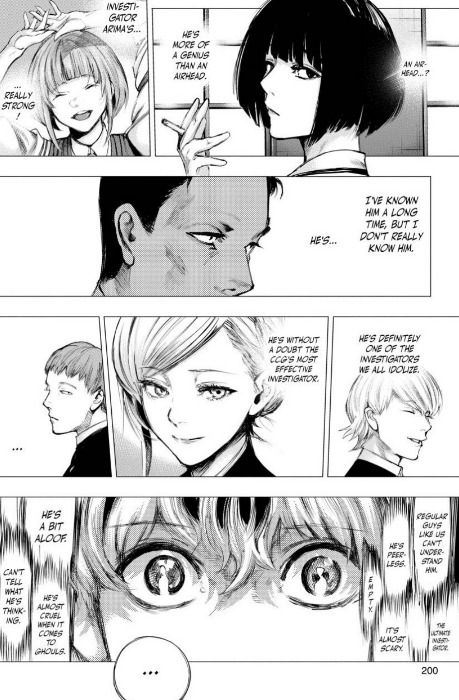
Arima is a breeding project, who was bred by the Washuu Family who mxies blood between humans and ghouls through a series of controlled marriages for the purpose of creating hybrid ghoul human children. Arima isn't the ideal hybrid they were looking for, but he was so ungodly talented he quickly rose to being the most powerful and well-respected investigator in the CCG.
However, this is how Arima reacts to the fact that his entire purpose in life was just to be a weapon to kill ghouls.
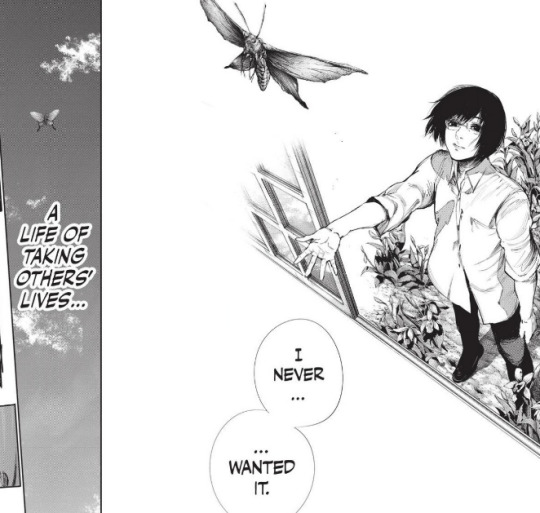
Arima loathes violence, he loathes being an investigator, he loathes himself most of all and designs his entire political revolution around him finally being killed by Kaneki - to punish himself and also to relieve himself of the burden of living a life where he was only meat to kill others.
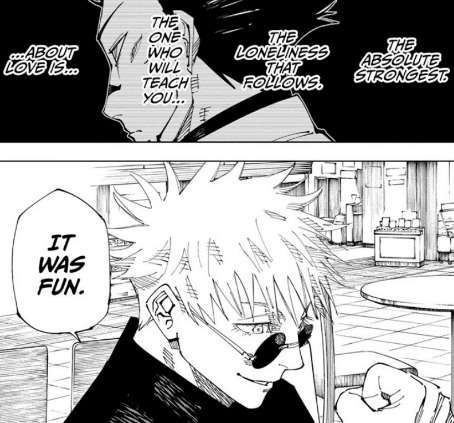
Gojo on the other hand loves being the strongest, he lives for Jujutsu. Arima's death is tragic and nihilistic believing his life had no real worth because all he ever was was a weapon to hurt others, whereas Gojo died satisfied.
Arima's last battle against Kaneki is grim, silent, and tragic, he does everything he can to make Kaneki despise him, to force Kaneki to kill him by being the worst version of himself and when Kaneki still wants him to live he just slits his own throat because even if Kaneki forgives him he can't forgive himself. Gojo laughs his head off and has the time of his life fighting against Sukuna, and going out in a blaze of glory.
Gojo dies smiling, Arima dies finally breaking into tears after a life of pretedig to be cold and emotionless. Gojo's dying regret is 1) that Geto wasn't there to say goodbye to him, and 2) that he wasn't able to draw out all of Sukuna's strength. Arima's dying regret was all the pain and suffering he caused throughout his life and how he was never able to rise above his circumstances and be anything other than what he was born to be.
These two characters are incredibly similiar, they are both the strongest, and they were both made into tools by a dehumanizing system they were born into. However, their attitudes are entirely different. Gojo enjoys being strong, and yes part of it is that Gojo himself doesn't realize he's a victim or what society has groomed him into becoming, but the other part is just because it's an ego trip for him. Gojo doesn't see himself as the tragic victim his fandom makes him out to be.
If you were to transplant him into Tokyo Ghoul Gojo would be happily killing ghouls, and he would think killing ghouls is fun because he's the strongest and best at killing ghouls. This is the complexity that is Satoru Gojo, he has been dehumanized and put on a pedestal his ow life, but Gojo also enjoys being on that pedestal and won't ever step down from it willingly.
I'm not saying that Arima is a better person than Gojo. I think the fact that Gojo doesn't think of himself as a victim is tragic in its own right, because he lacks the self-awareness to actually grow and change as a person. In the end both Arima and Gojo believe they couldn't be anything better than what they were, and their only release is death which is just insanely sad to me because as long as the future exists people always have a chance to get better no matter who they are. To give up on the future, to see an early death as a good thing simply because you can't endure life any longer is one of the most hopeless things imaginable.
Gojo's not sad because he was born to be a tool exploited for society's benefit, he's sad because he was lonely. He doesn't even realize it's his own darn fault he's lonely, because not only has Shoko said that he's not alone she's always been right there, but this chapter we get a repeat of Gojo's students begging him to let them in and Gojo himself decided to draw that line between himself and others and thinking an enlightened, godlike being like himself can't possibly be understood.

All of this to say I think Gojo is the sole victim here, but he's the middle of a chain of of victimhood. I think ultimately the biggest victim here is Yuta, and yes I will not only play trauma olympics here I'm going to win.
If this chapter goes to show anything it's that Gojo has completely failed in his ideals of protecting the youth from the dehumanizing system of sorcerers that takes children and reduces them to cogs in a machine.
A lot of people criticize Jujutsu Kaisen for dropping basically all of its political elements and themes of reform in the second half after Shibuya, and while I understand the criticism I think Gege intentionally shifted away from politics because Gojo's political revolution was never going to succeed.
From the beginning Gojo's solution to reforming Jujutsu Society and it's habit of taking away the youth of children and raising them up instead as child soldiers is... to make stronger child soldiers.
This is Gojo's blindspot and it has always been Gojo's blindspot.

It's why Gojo is completely okay with someone like Mei Mei who at the best uses her brother as a human shield to get out of curse domains and has stolen his entire childhood away to make him own pet little shoulder, and at worst actively molests him.
It's why Gojo is stated in the databooks to have only taken an interest in Megumi and Yuta because they were strong.

Gojo understands that he's being exploited by Jujutsu Society, but doesn't understand you need to deconstruct unfair systems of power and exploitation in order to build something better. Gojo from the beginning only had one plan, and that was to replace the people at the top with his own allies who'd support his agenda. He just thought waiting for them to die out and the children to grow up was the more peaceful way of doing it.
Gojo's political revolution was doomed from the beginning and that's why we see him go back on his word this chapter and just slaughter everyone at the top. His choice of a new leader for Jujutsu Society is hardly better than the elders, the person who executed Gojo's teacher and tried to get all the children to kill Itadori early on. Good choice.
This is what Gojo said would happen though, if he just wiped everyone out at the top no real systemic change would occur because they'd just be replaced with someone who wasn't that differet. Gojo's just given up on the notion of lasting change out of pragmatism.

Which is why Gojo himself is not that different from the elders in the first place, not because he's a bad person but because he was shaped by that same society and he's the pinnacle of that society.
I think the thing is and this point often gets ignored - a lot of the choices the elders make are because of outdated traditions like choosing to oppress Maki and Toji just because they challenge the traditional notions of cursed energy.
However, some of the decisions they make are out of cold hard pragmatism. Gakuganji actually turned out to be right in his assassiation attempt against Yuji Itadori. If they had succesfully killed Yuji, then the massacre in Shibuya would have been prevented and likely Kenjaku's plans would have been pushed back. The elders didn't sentence Yuta to execution just to be cruel, or just because they're superstitious but because he's already had several incidents of nearly killing people because he can't control Rika.
It's easy to dismiss the Elders as evil because they're just faceless entities, but then we witness in this very same chapter the main characters making the same heartless decisions out of the same sense of pragmatism.
Gojo understands Jujutsu Society is flawed, but doesn't understand exactly why it's wrong. He doesn't raise his students to be independent free thinkers because then they might question him, he raises them to be very powerful because that's more pragmatic.
Here are the next generation of sorcerers who are going to bring about the change to Jujutsu Society that Gojo so desperately seeks.
Nobara Kugisaki: Dead
Hakari Kinji: His greatest ambition is to start a fight club
Yuji: Actively calls himself a mindless cog and just wants to kill whatever society points him at and tells him to kill.
Maki: Mass murderer.
Yuta: Just stole Gojo's body and said he had to become a monster i Gojo's place.
Megumi: Begging to be killed.
Inumaki: Tuna Mayo
Panda: Is a Panda
(Joke lovingly ripped off from @kaibutsushidousha)
I understand that fighting Sukuna takes precedence now, but do you think once the dust settles any of these characters are going to do anything to make lasting change?
Are we going to see anything for them at the end of the road other than a mountain of their fellow sorcerers corpses?
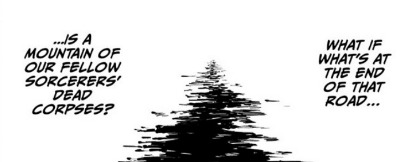
Gojo didn't nurture his students to grow into healthy adults, he raised them into stronger child soldiers and yes that's the pragmatic thing to do to help them survive in the Jujutsu World, but the elders make those decisions out of cold pragmatism as well.
MHA is also showing a story where the children are failing to learn from the previous generatio's mistakes, but it's far less frustrating to watch in JJK because it almost seems like that's the point?
Maki sacrificed Mai for the sake of becoming someone strong enough to reform the Zen'in Clan, only for her sister to die and Maki to slaughter the rest of her family failing in both her goals to reform her clan and protect Mai.
Yuji became the host of Sukuna in order to help others, because the total deaths of people in the world would go down if he ate all the fingers. Not only did that decision lead to the death of thousands in Shibuya, but he's even lost his role of being Sukuna's host to Megumi.
Yuta wanted to find a reason to live and a purpose in protecting his friends, and also wanted to pay back the man who saved him, not only is Yuta choosing to die in a way that breaks his friends heart he's also violating his beloved teacher's bodies.
There's a lot of arcs like this where characters fail in what they set out to accomplish, because like in most tragedies they don't try to grow as people they only care about getting stronger. It's the same choice over ad over again, a decision made of cold pragmatism that brings about their tragic ending.
I think it speaks to why systems like this perpetuate themselves, because it becomes so hard to hold onto your humanity that even trying gets you actively punished all the while people like Mei Mei crawl to the top. However, even if you throw your humanity away purely as an act of survival you're still helping perpetuate that system instead of fighting against it.
Anyway, that's enough hating on Gojo, onto the main event.
THE NEXT GOJO SATORU.
It's almost masterful how perfect the foreshadowing for this chapter's twist was. Yuta sharing a common ancestor in Sugawara with Gojo.
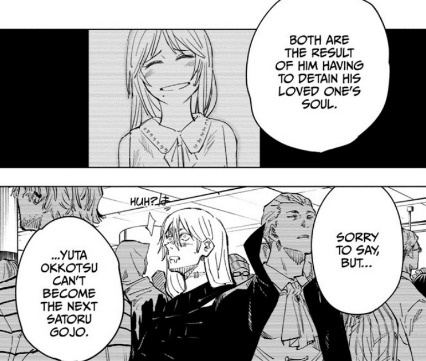
The irony that Kenjaku said out loud that someone like Yuta could never become Gojo, on top of the fact that Yuta's true power comes from detaining his loved ones soul. He's turning Gojo's body into a weapon the same way that he once used Rika's vengeful cursed spirit as one (he even channels her strength into a sword, the same way Maki uses the sword that Mai gave her life to create in battle).
The way that Yuji's first impression of Yuta from his powerful presence and cursed energy alone was calling him someone even creepier than Gojo.
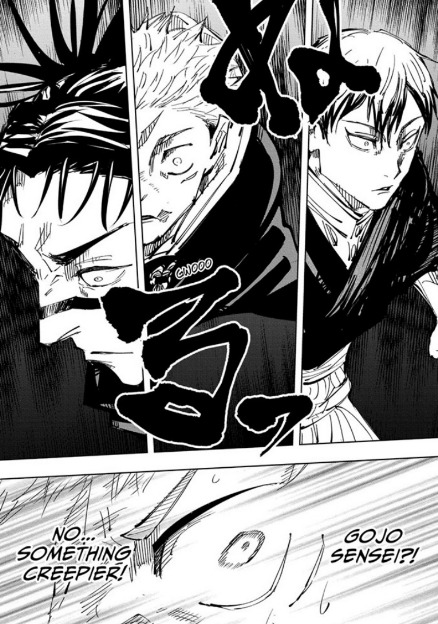
The idea that Kenjaku has been trying to get his hands on the six-eyes for years, which is what led most of the fandom to theorize a possible Kenjaku return by stealing Gojo's corpse. The fact Tengen said the six eyes, himself and the star plasma vessel are all connected and one time Kenjaku killed the six-eyes from a child only for another one to appear right away.
Yuta being told he could never reach Sukuna's heights because he lacks the selfishness of a calamity.
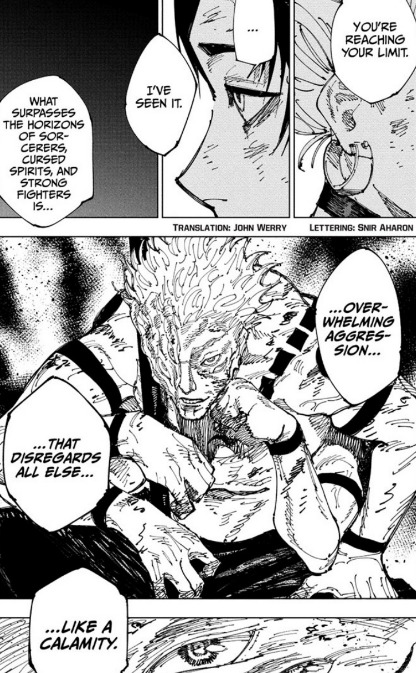
Even Yuta trying to tell a nameless assassin Uro to be less selfish, only to be chastised by her for not understanding because it's impossible for someone as blessed as he is to know what it's like to not have a name, to not have a face, to not be someone important.
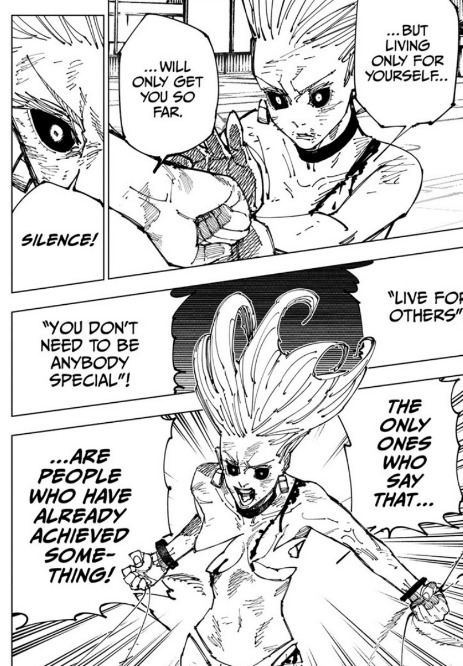
Now here Yuta is, not only is he making the selfish decision to use his teacher's body as a tool, he's also most likely in five minutes going to die in someone else's body, having sacrificed not only his name, and face, but also his personal values in order to become a monster.
This arc makes it seem like Yuta's gone against everything he's stood for, making his arc a complete circle from Jujutsu Kaisen Zero and that's kind of the point. Heck, even something as small as Yuta's decision to show mercy to Ishigori was rendered pointless because Sukuna immediately killed him soon after taking Megumi's body.
If Yuta's regressed in his character it's because Gojo's purpose was not to raise these children into healthy adults, but strong soldiers.
What happened to Yuta is a direct consequence of the way Gojo recruits these children, and the underhanded motivations he has behind those recruitments.
Yuta's decision to take Gojo's body is more tragic on Yuta's part then it is on Gojo's, because Yuta is a child, and Gojo is an adult.
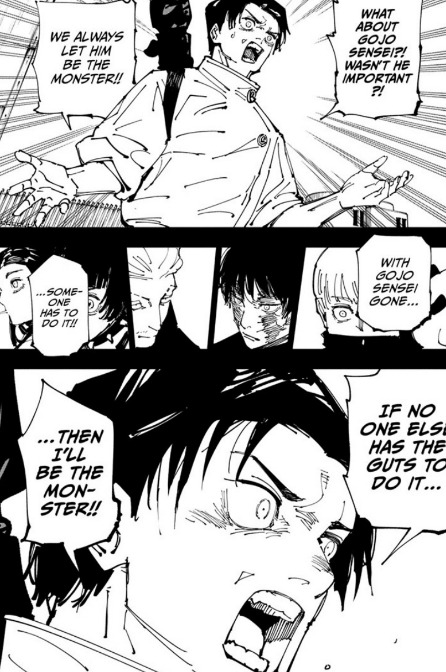
It is sad that Gojo is all alone, that he's forced to become a tool to society, but Yuta shouldn't be the one who feels responsible for that. Gojo is supposed to protect Yuta, he's the adult, the teacher, the one with power and Yuta is the child. Yuta is not the one who should be making this speech because it is not Yuta's responsibility to do any of this - but Yuta thinks it is because he owes Gojo.
However, when Gojo recruits people it's with the unspoken implication that they now owe him. He wants them to feel indebted, because then they'll be easier to use as pieces in his intended political revolution. We see this blatantly with the way he recruited Megumi.

I'll make sure you and your sister don't starve but you owe me in the form of labor later on in your life.
Gojo saved Yuta because he thought Rika was powerful and the elders were foolish for executing a potentially powerful sorcerer for THE GREATER GOOD instead of teaching him to control his power out of fear. Gojo recruited Yuji, because someone with Sukuna's power and who could eat his fingers as a vessel had the makings to be an incredibly powerful sorcerer. Gojo didn't even think of Megumi until after Geto defected, and Gojo decided he needed to start making changes to Jujutsu Society.
While Gojo's pragmatism is understandable to a point it also poisons his more nobler intentions. Since Gojo expects payment in return when he sticks his neck out for people, because these children are assets first and children secod.
I think Gojo likes Yuta. I think he gets along with him well. Yuta clearly respects him as a mentor. He did in fact go to great lengths to save Yuta from execution. He was right that it was more ethical to teach Yuta to control his powers rather than execute him for the danger he might represet. He even gives Yuta emotional advice a couple of times.
However, if Yuta was just like a grade 4 sorcerer with no special talent I doubt Gojo would have blinked at his execution. He sees Yuta for his talent first, and his potential to become someone like him. If anythig there are clear comparisons to both Megumi and Yuta. They're both prodigies born with incredible techniques, but Yuta is a lot more receptive to Gojo's grooming than Megumi is who's too traumatized to function. Gojo's not just grooming Yuta into being a powerful sorcerer, but another version of himself.
So it's almost karmic that not only does Yuta basically turn his back on everything that makes Yuta himself (his love for people, his desire to live and be surrounded by others), he also does so by literally becoming Satoru Gojo and transplanting his brain into Gojo's body.
Because Yuta is despite possessing a similiar level of talent as far from Gojo as possible. Gojo is not well liked by his comrades, he's there because he's needed due to his power. Yuta on the other hand has everyone vehemently disagreeing with his backup plan in the event of Gojo's death because they don't want to lose him.
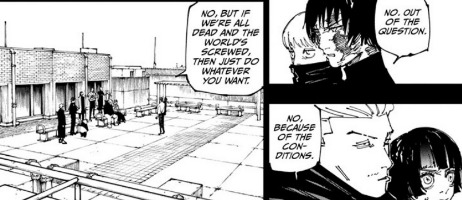
People need Gojo, they want Yuta because of the connections that Yuta has made with them and because they care about Yuta as a person. Gojo is someone who deliberately draws a line between himself and others because he believes the strongest can't be comprehended, Yuta only fights for the sake of being accepted by others because he needs their approval in order to live.
Yuta's now turned his back on those two things, his tendency to put his loved ones first, and his desire to live, both because he feels he owes Gojo.
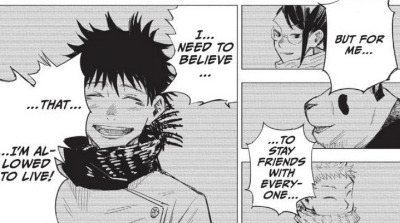
This comes about because of two factors, number one Gojo helping him with the implication that this help means that Yuta owes him something which makes Yuta desperate to pay him back and therfore easy to mold, and number two Gojo's intentions to begin with to take Yuta and make another Gojo out of him. To make a successor who would carry on the same burdens that Gojo did.
Gojo succeeded one hundred percent in making his successor as opposed to Megumi who turned out to be too different from Gojo i the end. He took what make Yuta unique and ironed out all those wrinkles until he was left with someone willing to make the same inhumane, pragmatic decisions that Gojo was.
I think it's tragic that as much as Gojo wanted to make things better for the next generation, he basically led Yuta down the same road he did, to make the same choice to throw his humanity away along with all of his loved ones. Especially since Yuta started out in such a different place.
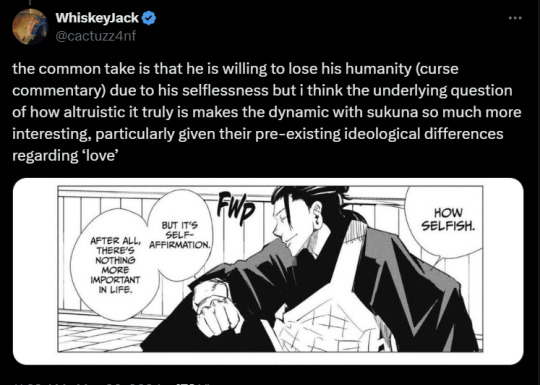
Yuta has learned to become selfish like Gojo, because selfishness is apparently now the only way to get by in this world. A cycle that has been started with the elders, and continued on with Gojo, remains unbroken as Yuta becomes just another link in the chain. Yuta's likely going to die in a stranger's body, leaving all of his friends behind to mourn him, but even if he lives what life will that be exactly?

It speaks to the arcs in Jujutsu Kaisen that they're all kind of circles at this point. We have this heartwarming goodbye of Rika telling Yuta to live, and Yuta's whole arc was to learn to try to live without Rika and make new friends, but it's now likely goig to end with Yuta dying a year after Rika finally moved on.
Choso was told to try living on as a human and Yuki even sacrificed her life to give him the opportuity to escape the fight, and he only lived a month longer to die right in front of Yuji's eyes.
Gojo put all of his hope in the next generation, but now not only did he put all the power in Gakuganji's hands but he ended up dying a year after Geto did just like Yuta will likely die a year after Rika.
I think these character arcs are turning out to be circles because the characters aren't actually doing anything to try to break the cycles that they're trapped inside of - they're only trying to get stronger. Which is why they end up resembling the actions of the villains, Yuji becoming more curselike, Yuta stealing Gojo's body the way Kenjaku did with Geto's.
It reminds me of a quote from Critical Role that I absolutely adore.
“I have just taken an audience with the Raven Queen who has snuffed any hope of my redemption, for which I am truly grateful. With new clarity, I can finally see my life as a series of compounding, poor choices.” Vax winces. “There was nothing I could’ve done to save my family, yet I still sold my soul in search of vengeance. Later I allowed Ripley to leave, knowing full well she was a greater threat to the world than the Briarwoods would ever be. I traded the world’s safety for the belief that I could murder my way to peace; that if I could be a greater horror, it would bring my family back. And once this lie was shattered I scrambled to find asolution, to make a deal, to undo my mistakes and balance the scales. I nowunderstand that there are no scales, there is no redemption, and no ledger that judges me good or evil. I am free to simply be myself and live with the terrible mistakes I’ve made."
Especially this sentence: I believed I could murder my way to peace; that if I could be a greater horror, it would bring my family back.
Maki is a character that I have not found all that interesting in a while because she committed such a huge mass murder, only for it to have no consequences in the narrative and never be mentioned again, but this chapter she suddenly became an interesting character again.
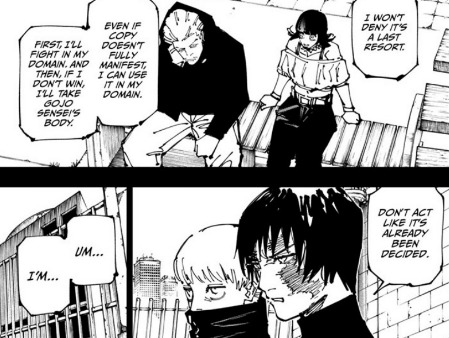
Maki who lost everything but gained strength, doesn't seem all that bothered by the loss. People compare Megumi's reaction to losing Tsumiki to Maki's reaction to losing Mai, but Megumi's reaction is much more interesting because it's always better to see a character be weak and fall apart then to be strong and power through things.
However, maybe the reason Maki hasn't experienced any grief at all towards Mai and has instead delighted in her newfound strength and independence is because of this, because she still had Yuta.
Maki is a character who's not really said anything other than exposition the past like twenty chapters, but now she's the most vocally against Yuta sacrificing himself for the greater good. Yet this is against Maki's own ideology of doing everything you can to be stronger, to win. Maki was always about individualism, not about friendship or the bonds between others, she severed her own bonds to be free. Yet, she can't stand to see Yuta do the same thing as her, to become more like her.
This might be the consequence of Maki's continued choice to value freedom and the power to achieve that freedom over all else. Now, the one time Yuta is trying to throw away the same things that she threw away she can't say anything meaningful or convince him to stop him.
Which reminds painfully of this chapter as well.
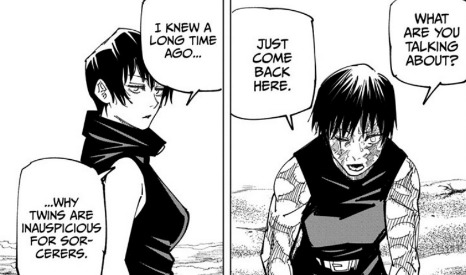
Mai killing herself in order to free Maki from cursed energy is an obvious parallel to Sukuna devouring his own twin in the womb, but the difference is in this situation Maki didn't want Mai to go, she begged her not to. However, just like with Yuta there was nothing Maki could ahve said or done by that point to convince Mai to stay. Maki has always chosen power over her sister, she's always abandoned Mai, so what exactly can she say to convince her that she cares more about Mai more? That her dream of defeating the Zen'in and having revenge against them isn't worth the price if it comes at the sacrifice of Mai?
Maki didn't want to abandon Mai, or for Mai to sacrifice herself, but tragically her every action indicated otherwise. It all comes down to this: I believed I could murder my way to peace; that if I could be a greater horror, it would bring my family back.
Maki seems to have achieved peace by murdering the Zen'in, but we see the same kind of circular arc that we have for Yuta.
Maki gave up on everything for strength, but Maki's not strong enough to finish Sukuna then and there, forcing Yuta to sacrifice himself the same way Mai did.
Maki can't talk Yuta out of making that sacrifice, or come up with any convincing argument with why he shouldn't because of all the choices she's made before this.
Maki chose to murder her way to peace, but it came at the cost of her humanity and growth and thus she's faced again with the exact same situation with Mai and she's forced to watch her heart be taken from her again.

It goes to show that we think these characters are getting stronger but they're actually sacrificing something vitally important.
These characters are just going to keep going around in circles and you have to wonder just when is it going to stop?
647 notes
·
View notes
Note
This question has probably been asked before, but I'm curious about how the authors viewed some issues like feminism/gender equality, mental health (I know that a lot of them experienced mental illness, but did they believe in seeking help and things like that? Or were they trapped by stigma?), education, racism, and maybe how they viewed love (Kunikida deserves someone. Real-life Kunikida had it rough and so did Dazai).
Actually, I don’t think I can really answer this question because while feminism, mental health, and racism are issues in Western culture today they were not really issues (at least not in the same way) in Japanese society while the authors were alive. Feminism and racism still aren’t really issues in Japan.
Feminism and Racism
Here is an interview with people in Japan about Feminism:
https://www.youtube.com/watch?v=fcqxH6hdOUw
Here is a video about Racism in Japan:
https://www.youtube.com/watch?v=8UET38Ze4pY&t=50s
I looked through a lot of videos and sources, and these two were the two that seemed to be very realistic, practical, and accurate depictions of what these issues are like in Japanese society. Even being opinionated and arguing are very different in Japanese culture. And I prefer to listen to actual people who live in Japan and experience the culture to scholarly studies and research papers (I took enough statistics classes in university to understand that statistics cannot be trusted).
Mental Health

Mental health is an issue and was an issue during the Shōwa period in Japanese history, when most of the BSD authors were writing (some, like Fukuzawa and Mori wrote during the Meiji era). The two authors who come to mind who had to deal with mental illness the most were Akutagawa Ryuunosuke and Dazai Osamu, so I think that their experience with it will shed some light on how mental illness was viewed and handled during that time.
Akutagawa wrote: “My mother was a madwoman….She used to sit alone in the house at Shibia, her hair in a bun held by a comb, puffing at a long pipe. She was a small woman, with a small face that was somehow grey and entirely without animation….I remember that on one occasion when I went upstairs with my foster-mother to say hell to her, all of a sudden she hit me on the head with her pipe. But she was usually a very placid lunatic. When my sister or I pestered her to, she would draw pictures of us on sheets of writing paper….But the people she drew all had foxes’ faces (Tenkibo, Chikuma Shobō 3, 305). Akutagawa’s mother was very superstitious and, just a few months after the death of her daughter, found out she was pregnant with Ryūnosuke but was very worried because she was 33 and her husband 42 which was considered as “periods of great danger”. After Ryūnosuke was born the parents formally ‘abandoned’ him and he was ‘taken in’ by a family friend, before being accepted back into the family. I guess this made him more of a ‘foundling’ than a ‘child’ which counteracted the bad luck surrounding his birth.
Akutagawa’s mother was basically kept hidden away and he would visit her in her room. I do not know if it was to preserve their family’s honor or because they did not have money to try and get help at a mental facility or if there was even mental health available (if it were it would definitely have been much different than what we have today because of how new mental health was in the medical field). Mental health institutions in Japan have been around since the Meiji period (1868-1912) and the Law for the custody for Insane People was enacted in 1900 according to this source. It was only in the early to mid 1900′s that mental health institutions were really available in Japan, and Akutagawa’s mother would have died before that because Akutagawa’s mother passed away in 1903 when he was eleven. Akutagawa himself committed suicide when he was 35 years old. Akutagawa lived in fear that he would also become insane just like his mother, and it is very possible that he suffered from schizophrenia. Many of the books I have read imply that mental illness was a major motivator in his suicide.
Dazai Osamu lived with mental illness. The Saga of Dazai Osamu says on page 39, “…his friends held a celebration banquet at the famous Seiyouken restaurant in Ueno. But ,witnesses to the event recalled, the guest of honor was a sorry sight. The state of his mental and physical health was all too visible. Satou Haruo had induced him to enter Saiseikai Hospital in February to treat the drug addiction, but the left only two weeks later, still uncured. He wandered around for the next few months in almost total disorder. In August he went to Tanigawa hot spring, in another halfhearted and unsuccessful attempt to break the addiction.” In 1935 he was admitted into the Musashino Hospital. Dazai was taken to the hospital by his mentor Ibuse Masuji, a family friend Kita Yoshishirou, and his wife Hatsuyo and after arriving he was surprised to learn that he was being admitted as a patient and that it was a mental hospital. Dazai believed that he was a victim and that they were plotting against him, but at the same time he was aware of his own condition. But in the hospital he was able to beat his addiction and lung condition (only to find out that while in the mental hospital his wife cheated on him, but all of that is addressed under the Dazai and Women tag on my blog).
Dazai was able to put his life back together for a short time, remarried, had children, and became even more popular as a writer, but after a while his struggles with alcoholism, addiction, and women came back and he ultimately never recovered from them and committed suicide in 1948. He never did return to the mental hospital or received any other medical or mental health treatment.
Education
Education has always been very important in Japan. Fukuzawa’s Encouragement of Learning is about reforming the way Japanese education was structured and what it taught in order to raise citizens who would be able to help Japan compete on a world-wide scale and grow as a world power. Before the focus of Japanese education was on the Chinese classics and poetry, but Fukuzawa helped to bring math and sciences into a greater focus, make reading/writing more accessible by teaching kana (the Japanese alphabets) rather than focusing on memorizing thousands of kanji in order to read anything, and making education more available to people who were in the lower income range of society. I made a list of the authors and their university education here, and even if the authors did not attend university due to financial reasons they were always reading and learning on their own. Reading is a huge deal in Japan (they use more paper to print books than make toilet paper, if that gives you an idea).
Love
Japanese people are usually more reserved about love and relationships. It isn’t uncommon for people to date and only tell their families and friends they are dating the person after the relationship is very serious (sometimes they don’t let anyone know until they are practically engaged). There is an interesting article on love in Japanese culture here.
But I think it is safe to assume that all the authors wanted to find love and they did it in their own ways, just like people do today. And love is such a broad topic that I don’t think I can cover it accurately in this post. I’ll leave a few little bits of information here that I know, though I know it won’t even begin to cover the topic.
Kunikida “met his future wife, Nobuko Sasaki, on whom Takeo Arishima is thought to have based his famous novel A Certain Woman. Against her parent’s wishes (Nobuko’s mother encouraged her to commit suicide rather than marry Doppo), the couple was married in November 1895. Kunikida’s ensuing financial difficulties caused the pregnant Nobuko to divorce him after only five months. The failed marriage had a traumatic effect on Doppo…” (source). In the special bonus Uemura Detective Agency (a special show where Atsushi’s voice actor interviews the other voice actors on the DVDs, which I unfortunately do not have a link for) Kunikida’s voice actor made a comment that the two were willing to fight against her family in order to get married, and he had a little discussion with Atsushi’s voice actor about how Kunikida must have been very direct and strategic in order to convince her to marry him (they even acted out how Kunikida might have done it with Atsushi doing a very convincing Sasaki-san voice, it was so sweet and womanly that they laughed quite a bit about it). But it is obvious that love meant a great deal to Kunikida. He did remarry the next year, but died from tuberculosis ten years later.
Atsushi was a man with “clean-cut features, a slender body caused by his sickly constitution, and the mysterious air” about him. He was “quite the popular professor at the school. The students weren’t the only ones who found him mysterious. The sentiment was even shared by his fellow teachers. His co-workers had always assumed that he was single, even if the comings and going of his bank account were perhaps a little strange. However, when someone brought up an arranged marriage meeting, his revelation that he in fact had a wife and a child filled the staff room with a stunned silence… Whenever a school trip brought the students to the ocean, swimsuit-clad girls would cling to him, and often he could be seen meeting up with female students on days off or after school. Adultery! This was the assumption many people quickly jumped to, but according to some friends of his, after having glanced in his journal one day, they discovered that he had just been listening to the girls’ troubles and giving them life advice” (source). Atsushi was a very kind, proper sort of person who kept his private life private, so we do not know much about his relationship with his wife. However, he was a good husband and never cheated on his wife (at least to my knowledge). His take on love and romance was very different from Kunikida’s to be sure.
You probably already know about my recent posts about Dazai’s and Tanizaki’s love lives. I also made a post about Chuuya’s love life here. These other two aren’t exactly about love, but I have a post about different authors and their sexuality here, and I have a series of posts with pictures of BSD fathers and their children here, so you can see them with their cute kids (even if we don’t know too much about their love lives it is more likely that they loved their wives and children enough to get married and have children; family is important in Japan). Other than that, I don’t really have a lot of background knowledge on the author’s views on love.
●~●~●~●~●~●~●~●~●~●~●~●~●~●~●~●~●~●~●~●~●
I hope that this can at least begin to answer your questions about these subjects. And I always tend to answer these kinds of questions more based on the authors I love the most and study the most, so I’m sorry if that makes it less valid and reliable (I wish I had the time and resources to study all the authors in depth, but there is never enough time and not enough Japanese literature is translated into English). And I am definitely not an expert on social issues (I went into elementary education, so my area of expertise is ABCs and 123s). But despite the flaws I hope that this can be helpful to you! Thank you for all the support and for following my blog! I love seeing you around Tumblr!
73 notes
·
View notes
Note
I find it rather sad that Dazai's loyalty to his friends doesn't extend to his lovelife. I pity anyone who actually fell for him since he uses it more like a pastime or a means to manipulate. Aside from being somewhat based on real life Dazai's later years, it might also because none of BSD Dazai's women got as deep as his friendships and he never took it seriously.If he ever will, how would he take it seriously?Can a positive romantic relationship w/ depth also inspire him like his friendships?
As far as BSD Dazai goes, we haven’t really seen him in a serious relationship with a woman and even with Odasaku and other trusted friends he never really lets his guard down. He does open up to Oda more than he does anybody else, and it could be argued that rather than having that deep sense of trust with other people like Kunikida and Atsushi he instead has a deep understanding of what makes them tick because he has to include them in his plans and strategies. But I believe that BSD Dazai really does have a kind of friendship and trust with every member of the Agency as well as a few members of the Port Mafia (Hirotsu, Chuuya, and Kouyou mostly). All of these relationships are complex and different, but I think that Dazai sees them all as more than just pawns to manipulate or a way to entertain himself.
Keep reading
207 notes
·
View notes
Text
On “Crime and Punishment”, Fyodor Dostoyevsky, and Bungou Stray Dogs
ft. Nikolai Gogol. LONG POST! Also spoilers for the novel/manga if you haven’t read it already/haven’t caught up yet.
Here are some thoughts I have on certain parallels between Crime and Punishment and Fyodor Dostoyevsky in real life and as portrayed in BSD, also some speculations as to how this book and the real Dostoyevsky might have inspired his BSD version.
Keep reading
1K notes
·
View notes
Text
BSD Book Rec: The Setting Sun, Dazai Osamu
So @akai-koutei and @anantagonist have been such lovely book rec buddies and I couldn’t wait to talk about one of my absolute favorite books!! As usual, kudos to @anantagonist for the amazing graphic edits! :D And @datura-foxglove I’m so happy you’re going to read this book soon, I’m certain you will love it!

Dazai Osamu is a hugely popular Japanese author whose influence extends outside of Japan and whose treatment of difficult subjects resonates with readers from all over the world. I adore and enjoy Asdagiri’s portrayal of him in Bungou Stray Dogs, with the well-preserved subtleties and quirkiness that characterized the author who inspired the BSD counterpart. The Setting Sun is a significant book that portrays the moral struggle of post-war Japan from a unique perspective, and can touch general readers and hardcore fans of BSD alike.
About the author
Dazai Osamu has been compared with Rimbaud, and even referred to as the forerunner of Mishima Yukio. He was particularly exceptional in “autobiographical fiction”, or “I-novel” genre, in which a work of fiction seamlessly incorporates elements of the author’s own life. Throughout his tumultuous life, Dazai made multiple attempts at dying, and finally succeeded in a lover’s suicide with his mistress, Yamazaki Tomie. Although he died in 1948, Dazai continues to have a cult-like following in Japan, and remains one of the most influential modern Japanese authors.
About this book
Possibly Dazai’s most widely read work, The Setting Sun reflects the social and moral crisis the people of Japan went through in the post-war era. The book was so influential that the term “the people of the setting sun” has been permanently made synonymous with the declining aristocracy, and become part of the Japanese language. The protagonist of the story, Kazuko, called herself and the man she loved “victims of a transitional period of morality”. The respected English translator of the book, Donald Keene, stated that Dazai’s world “suggests Chekhov or possibly postwar France, but there is a Japanese sensibility in the choice and presentation of the material”.
Partially inspired by the diary of a woman named Ota Shizuko with whom Dazai had a passionate relationship, this book showcases Dazai’s imagination and keen perception, with his characters, decadent, impoverished, kind-hearted, vividly portrayed in an utterly human manner. And something this book manages to convey that Dazai’s works usually didn’t, is the willingness to struggle and live despite the cynicism and despair so often displayed in the author’s own life.

Quick summary
This book tells the story of Kazuko, her brother Naoji, and their gentle and loving mother. Kazuko’s poverty, Naoji’s struggle with his addictions and mother’s illness drove them to despair and hopelessness. Naoji suffered from drug addiction and subsequently alcohol addiction, which was presumably his attempt to self-destruct in the hope of eventual death. In seeking help for Naoji, Kazuko met her love interest, whom she affectionately called “Mr. M.C.”, which stood for “My Chekhov”, then “My Child”, and “My Comedian”. Kazuko struggled and lived through grief, heartbreak, love, abandonment, doubts, and vowed her resolve to continue fighting, to “live in perpetual struggle with the old morality, like the sun.”
Keep reading
159 notes
·
View notes
Text
“Not that I ever become violent. Quite the contrary. Whenever I get excited or inspired over something, that faint sound of hammering arises from nowhere in particular, and I grow quite placid. The scene before me suddenly changes, leaving only a blankness in place of whatever images were present. I simply stare straight ahead, with a feeling of utter stupidity and emptiness.”
—
Dazai Osamu, The Sound of Hammering

Dazai wrote this story in 1946, shortly after the Japanese surrendered to the Allied forces. A young fan wrote a letter to him relating a sound he had been hearing. Dazai, realizing the literary potential of the experience, asked for permission to use it as a motif for his story. The Sound of Hammering describes the traumatic effect of the war on the younger generation, like a distant but haunting sound constantly sapping their will and sense of purpose.
“In the middle of this swaying twilight, I saw the flags with their blazing red color… Ah, I wept over that color. Even if I were to die, I would not forget this scene. And then, distant and faint, the sound of hammering arose. And that was it.
What does that sound mean? I can’t be dismissed simply as nihilism or whatever, for the illusion of hammering obliterates even these things.”
“If you love someone, you will be loved in return. Isn’t there some truth to that?”
The story consists almost exclusively of two letters, the first from a youth to a writer as a moral authority, and the second from the writer to the youth. While the youth’s letter took on a desperate imploring tone, Dazai probably thought it fitting to deny himself the position of a moral authority, and thus the writer only sent a cold, ignorant reply.
“Agonizing, isn’t it? Well, I don’t have much sympathy for a hypocrite. You still seem to be avoiding an ugly situation that can’t be explained away, a situation others see and point a finger at. Real thought takes courage more than intelligence. […]If you can sense the thunder in these words, you will not be hearing things anymore.”
Source: Crackling Mountain and Other Stories, Dazai Osamu.
79 notes
·
View notes
Text
#bsd #a window breeze for him
#dazai
Why doesn’t Dazai cry?
ft. Atsushi’s sunshine.
Something that struck my interest was how even as Odasaku was dying in his arms, Dazai didn’t cry.
But it wasn’t because Dazai doesn’t know the concept of crying, or why people cry. Dazai may be emotionally stunted, but I think he at least understands what moves people to tears, although he doesn’t necessarily experience that himself. It seems to me that at least now, in the current development, Dazai understands what emotions would induce someone to cry their eyes out.


Isn’t it fascinating that Atsushi, someone who normally wears his heart on his sleeves, speaks what he thinks, unreservedly runs into danger to rescue his friends, is now asking for advice from Dazai - who constantly hides his emotions under wraps, not revealing the slightest clue of his real thoughts - on how to express himself?
Emotionally, Atsushi is, or should be, arguably more mature than Dazai. Dazai has difficulty expressing his emotions, so he hides everything under a beguiling smile. He also doesn’t, or didn’t, experience emotions like how people usually would (I hope we will one day learn how he came to be like this). I haven’t read the light novel yet, but based on the translations and excerpts I found, in the Fifteen light novel, there was a scene of Dazai finishing off a dying man with his gun, and after the man was dead, continuing to fire at his body until Chuuya told him to stop. Dazai, instead of feeling fear, was bitter and angered by how easily death came to some people, while he had to keep up his meaningless existence. In another scene (first meeting with Chuuya), as Chuuya crushed Dazai’s hand under his foot, Dazai watched as if the hand was someone else’s. Similarly, in the Dark Era light novel, while Odasaku was clearly saddened by the thought of Ango’s betrayal, Dazai laughed at the thought of himself being driven into desperation after discovering that their best friend had betrayed them.
It wouldn’t be surprising if Dazai’s emotional development was interrupted before he could learn how to deal with his feelings. This led to inappropriate and unusual responses to situations what would usually lead someone to feel happy, sad, or afraid. On the one hand, he looks like a child who grew up too fast and became an “adult” before he was emotionally ready. On the other, he is an adult in every sense except emotionally, and who occasionally reverts to being a child because he never had a chance to be one, and he never got a healthy emotional development to begin with.
In the opposite end of the spectrum, Atsushi, having been raised in hellish conditions, isn’t afraid to show his heart. He knows what living in hell feels like, so the moment he experiences true happiness, his smile shines. He also knows how it feels like to be told “you’re not worthy of living”, so when he meets a vulnerable person, he extends his hand without hesitation, and tells them it is okay for them to live. He isn’t afraid to cry when he’s upset, and isn’t afraid to smile when he’s feeling warmth. One can say he has experienced the whole spectrum of emotions, and he possesses both the understanding of and the physical ability to express them.
Dazai, on the other hand, has likely experienced only a fraction of Atsushi’s emotional spectrum. He’s more familiar with certain emotions (mostly negative ones), and almost clueless about the rest (what is happiness?). The only times we catch a slightest hint of joy in him were when he was with Odasaku and Ango, and more recently, rare moments with the Detective Agency. But even in those moments, his joy was most likely mixed with confusion, hesitation and uneasiness because, NO ONE is EVER SAFE and this boy is constantly thinking of ways to fight whatever danger’s coming up ahead. He is also constantly plagued by the thought that one day, these joyful moments he cherishes will slip out of his grip. What better way to pre-empt this fear of loss than never getting too attached in the first place??
Both Dazai and Atsushi had been through hell, but because of the differences in their natures, the circumstances and the environments they were in, Atsushi responds by pouring his heart out, while Dazai seals everything in.
Which brings me back to those panels: Why did Atsushi need to ask Dazai for advice on how to express himself in that situation?
My thought is that at that moment, Atsushi was experiencing something he never knew before, but Dazai was all too familiar with: emptiness.
Atsushi’s survival instincts, at odds with his own self-deprecating nature, were largely because of his head master’s brutal way of drilling the desire to live into his flesh. He lived on by hating that man. He knew true joy because that man denied him happiness. He knew true pain because that man constantly reminded him of it. Yet, in this moment, he didn’t know what to feel, because that man was no longer alive. Atsushi didn’t know what it was like to be empty, until now. He was beyond suffering and he didn’t know what to do about it. (look at his face, it screams BEYOND SUFFERING)
Which is why Dazai told him to come back down, to express himself whichever way he wants to. Dazai told him to cry his heart out, like he normally would. The usual Atsushi-kun shouldn’t be afraid to let out his feelings. So if what he feels is emptiness, then it’s better to cry it out until he is no longer empty.
Dazai, on the other hand, was all too familiar with emptiness.
What exactly did he feel as Odasaku was dying in his arms? Sadness? Fear?? Hope???

(Hello darkness my old friend).
I think, by this time, Dazai was already beyond sadness. He was left empty for too long. The only source of light in his dark days was his friendship with Odasaku and Ango, especially Odasaku, who could have guided him out of that eternal void of loneliness. But when he lost Odasaku and Ango, Dazai was left all alone, again. That familiar emptiness prompted him to respond in the only way he knew how - to seal it back in.
Just as Dazai never once smiled truly, purely from joy, he also never once cried to acknowledge his suffering (unless he did when he was younger, which I am dying to know), because before he knew how to deal with sadness, loneliness, or pain, he was already beyond suffering, in an abyss far darker and emptier than that.
1K notes
·
View notes
Text
#jjk #satoru #suguru










Satoru lost it. His anger was showing, raw and clear. Gojo Satoru who always looked foolhardy, narcissistic, and goofy crumbled in front of Geto Suguru. Suguru who was the most important part of his plan and future vision, who he thought would stay forever by his side to fight with him, not against him. Suguru who he probably put first in the world that he had built in his head before anyone else. Suguru who he thought he could always return to when his demon overwhelmed him. The man who barely contemplated about weaker people's lives and had to be reminded about their worth, screamed and yelled about what Suguru shouldn't and impossible to do. It did sound like a battle of ideals, a dispute about who's more right and more wrong. However, it might be something akin to fear and anxiety of being lonely again, as the strongest. Satoru's last straw to make Suguru stay and not stress about how to "correct" the world. To let them figure everything out together instead of doing extremes. Satoru's anger portrayed how Suguru truly meant to him. That he felt strongly about him and also wanted to ensure a better and secured life as a sorcerer for Suguru, far from being a criminal with death sentence appended to his name. For many people, anger could be the most emotive way to express their concern that stemmed from love. But Suguru was already deep in the water and Satoru never dared to pull him up, somehow.
ANGER and GOJO SATORU
364 notes
·
View notes
Text
#JJK #prematuredeath
riko amanai's death also being the literal and proverbial death of satoru and suguru's innocence. there's no need to explain this but god. like. there goes their promise to keep her safe if she chooses to not merge. there goes their youth, that brief stop they spent in okinawa. their purpose, to save non-sorcerers, their moral beliefs, gone with riko. there goes their assurance, the camaraderie that they know they're the strongest. because how can they be the strongest when they cannot preserve one child's wish to live on? who's only here because she's somehow pushed to have a pivotal role in preserving society's balance, just like them? what's the point in preserving society if they cannot even save one.
"strongest" is a farce when they're not strong enough to keep their promise, to keep each other safe, alive, and a girl who just wants to life a normal life, all of them robbed of their youth.
3K notes
·
View notes
Text
what they don't tell you about getting better at writing is that not only will you have to work on getting better at writing (intuitive, easy to understand) but you will have to work on getting better at all the parts of writing that are not writing (confusing. terrible)
6K notes
·
View notes
Text
"You might love him initially for his good looks and sultry sounds, but Hozier’s legacy will be one of championing international anti-colonial solidarity through his art, as well as his actions in a time of rampant injustices."
The Powerful Anti-Colonialism Of Hozier by Merryana Salem
877 notes
·
View notes
